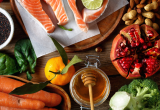

Excessive consumption of red meat is associated with an increased risk of cancer mortality, especially in patients suffering from liver disorders such as non-alcoholic fatty liver. This condition is the leading cause of liver disorders worldwide. While there is currently no specific treatment for this disease, a recent study explored the protective role of leafy vegetables. According to this work, consuming around 30g per day of leafy vegetables is associated with a 22% reduction in mortality risk among heavy red meat consumers. The findings of this study underline the need to limit red meat consumption, but also demonstrate that adequate vegetable intake can mitigate the effects of excessive consumption.

A recent study evaluated the influence of social media on perceptions of norms relating to eating habits. Using a mixed factorial design, 52 students were asked to follow Instagram accounts on healthy eating or interior design for 2 weeks. Normative perceptions of fruit and vegetable consumption, energy-dense snacks and sugary drinks were assessed before and after the intervention. The results reported no significant change in the perception of what others consume, nor in participants’ own intentions. Nevertheless, the intervention led to a 1.37 portion increase in fruit and vegetable consumption and a 0.81 reduction in energy-dense snacks. Thus, this work demonstrates the potential of social media-based interventions to promote healthier diets. Future work is needed to replicate this model on a larger, more diverse sample.

A recent study carried out in Germany examined children and adolescents’s diets to identify the main determinants of greenhouse gas emissions and resource use (land and water), as well as trends over time. Secondly, this work analysed the associations between these environmental impacts and the adequacy of nutrient. Meat, dairy and sugar products were the main contributors to greenhouse gas emissions and land use. Non-alcoholic beverages, meat and fruit and vegetables were the main contributors to water use. For all environmental impacts, values per 1000kcal of food consumed increase with age. Finally, nutrient-rich diets were not associated with a reduction in environmental impacts. These results underline the need to find a compromise between sustainability and nutritional adequacy in children’s diets.

Acne vulgaris has a considerable impact on quality of life among young people. A recent study evaluated the association between dietary antioxidants and quality of life in 165 young women with acne vulgaris. A self-report survey was conducted to collect data on socio-demographic status, anthropometric parameters and lifestyle. Levels of polyphenols, phytosterols, lignans and selenium were determined using food diaries and the Diet 6.0 program. Antioxidant status was assessed using the new DAQI index. The results of this study showed that greater adherence to an antioxidant diet reduced the impact of acne vulgaris on quality of life by 30-32%, and the risk of depression by 33%.

A recent review assessed the effects of lifestyle interventions in patients with type 2 diabetes on gut microbiota composition and disease progression. The data collected in this work show that adopting a high-fiber diet and increasing fruit consumption have positive effects on insulin sensitivity as well as on gut microbiota composition. With regard to physical activity, this work reports that the intensity of exercise plays an essential role in the composition of the gut microbiota. Continuous exercise of moderate intensity has positive effects on anti-inflammatory microorganisms, while chronic exercise has beneficial effects on glycemic control and systemic inflammation. This work suggest the existence of a complex relationship between lifestyle, microbiota composition and type 2 diabetes. Personalised nutritional and exercise interventions are relevant strategies for the management of type 2 diabetes.




